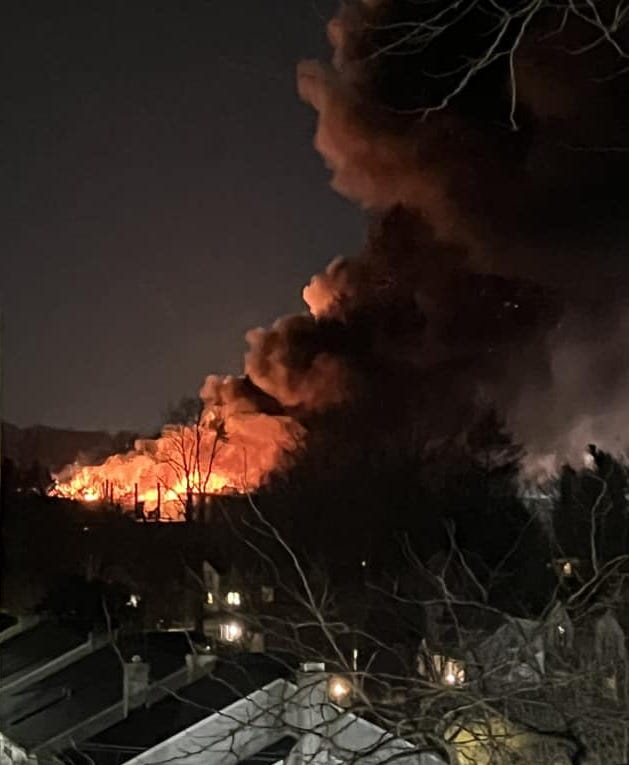As the Crow Flies: Borders are Often Arbitrary
We are all connected... regardless of geographic boundaries.
A manufacturing plant — a half mile from my home as the crow flies —always seemed much further away. A creek, train tracks, a circuitous route, and an arbitrary township border created the illusion of distance.
It was somewhere over there and I never gave it much thought.
I also had little knowledge (or curiosity) about what the company manufactured or the chemicals stored on site. Or that they were cited with DEP (Department of Environmental Protections) violations and fines in the past. Or that their sprinkler system was malfunctioning.
But when a massive fire accompanied by several explosions shot giant plumes of smoke into the air, I quickly grasped its close proximity to my home.
Aided by a strong wind, toxic debris and ash rained down on a large swath of my suburban Philadelphia community. Schools, colleges, businesses, train and bus lines, and all activities were cancelled. The areas hardest hit endured smoke and chemical odors in their homes, and several hundred households were evacuated. Those of us more fortunate were merely required to “shelter in place.” Initial coverage of the fire was reported in the national news, including in the New York Times and Los Angeles Times.
After five days, and with assistance from 69 local fire companies, the blaze and smoldering hotspots were extinguished. Nagging questions remain, though, about what caused the fire and the potential environmental impact on waterways and the air we breathe.
In retrospect, I wish I had been more aware of this neighbor and their business practices.
How this relates to the rest of us
Arbitrary borders encircle communities, creating the illusion of unity and safety. Identities are also formed through connection with community; comforting and familiar, they create a sense of belonging and remind us of who we are and where we fit in. Even far from home, those identities persist (e.g., a Lakers fan or a city dweller or a Southerner or an American.)
Yet, we are never too far apart from one another. What happens upstream or even an ocean away can affect us.
Wars are fought over patches of land. Pollution from miles away drifts into our towns. Immigrants flock to our borders, fleeing from atrocities in distant lands. Invasive species travel half-way around the world and damage crops and even the trees in our backyards. The spread of COVID-19 was a reminder that we are neighbors worldwide; we often cannot cordon ourselves off from something that is unpleasant or a threat.
During their recent contentious oval office meeting, Ukrainian president Volodymyr Zelenskyy warned US president Donald Trump that political divisiveness and wars know no boundaries: “You have nice ocean and don’t feel [it] now, but you will feel it in the future.”
When community connections go awry
It’s no surprise that people identify with their hometown, country, religion, and culture. But outsized loyalty to a particular community can exclude and separate us from others. It can blind us to what is happening in the country, the world, and even in nearby towns. And it can lead to isolationism and prejudices toward anyone viewed as different.
The tendency to “other” fellow human beings is pervasive.
When “outsiders” are viewed as flawed, and not considered a part of our greater community, prejudices can arise. Obvious examples include racism, gender bias, religious prejudice, classism, ethnocentrism, and nationalism.
“An irony of human nature is that while our survival depends on group living, the mere existence of group categories creates prejudice—a preference for one's own group or animus toward another and its members—which leads to discrimination, conflict, and the undermining of society itself,” wrote New York University and Harvard social psychologists David Amodio and Mina Cikara in the Annual Review of Psychology.
Even when prejudice is not part of the equation, ignoring neighboring communities — their events, actions, or even their oversight of business practices — can circle back to your own community.
It might seem obvious, but getting to know your neighbors, local businesses, and communities beyond your town’s borders makes sense. You might even have a chance to tackle problems before they escalate.
My illusions of safety and comfort were shaken by the factory fire. I was oblivious to the company’s apparent safety violations and how government oversight was lax. I felt cocooned by my neighborhood… a small, tree-lined community filled with like-minded folks. I drove past the factory hundreds of times but never realized that – as the crow flies – it also was my neighbor.
Boundaries are arbitrary and often imaginary.
We are all interconnected; we disengage at our peril.





What a frightening, sobering experience, Gail. I wish you and your community a swift and full recovery. 💚
Oh yes! Interconnected and interdependent. So important. (And I heard about that explosion in my state of Oregon and was hoping it wasn't near you!)